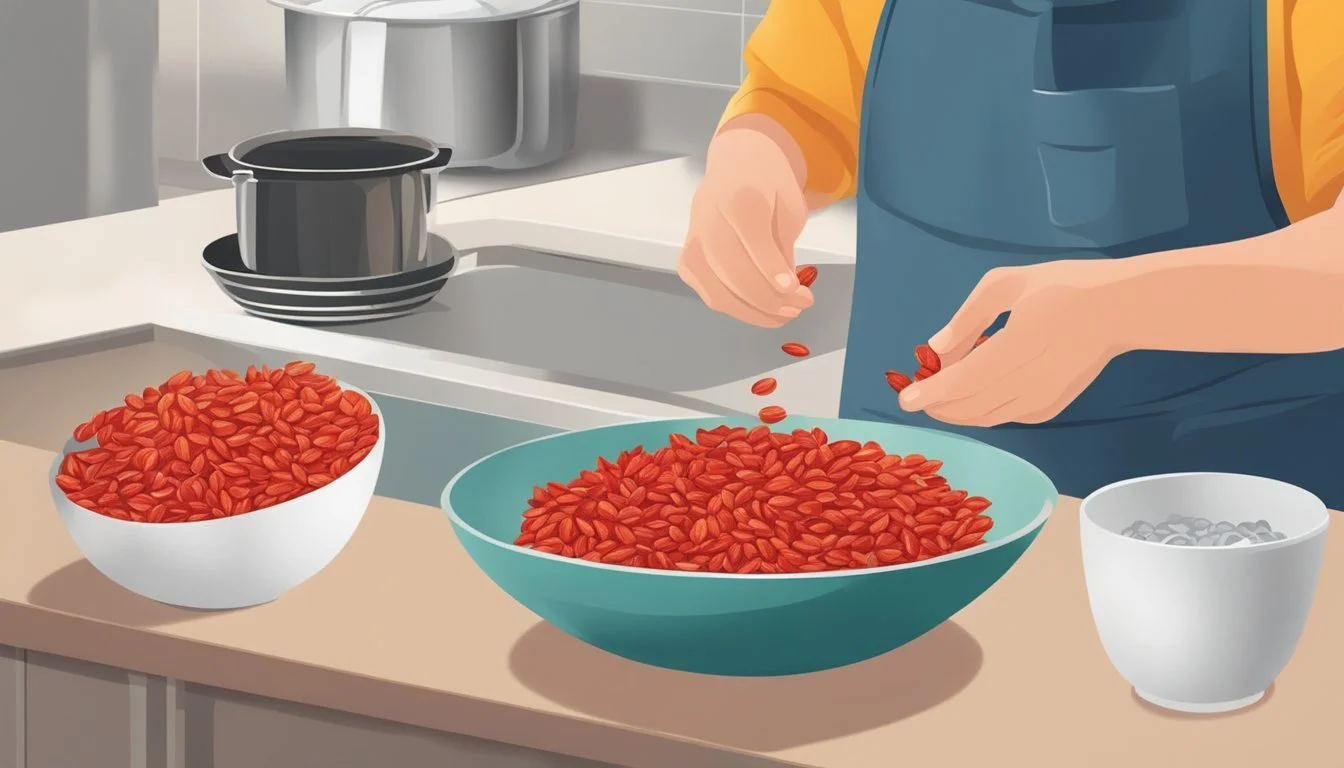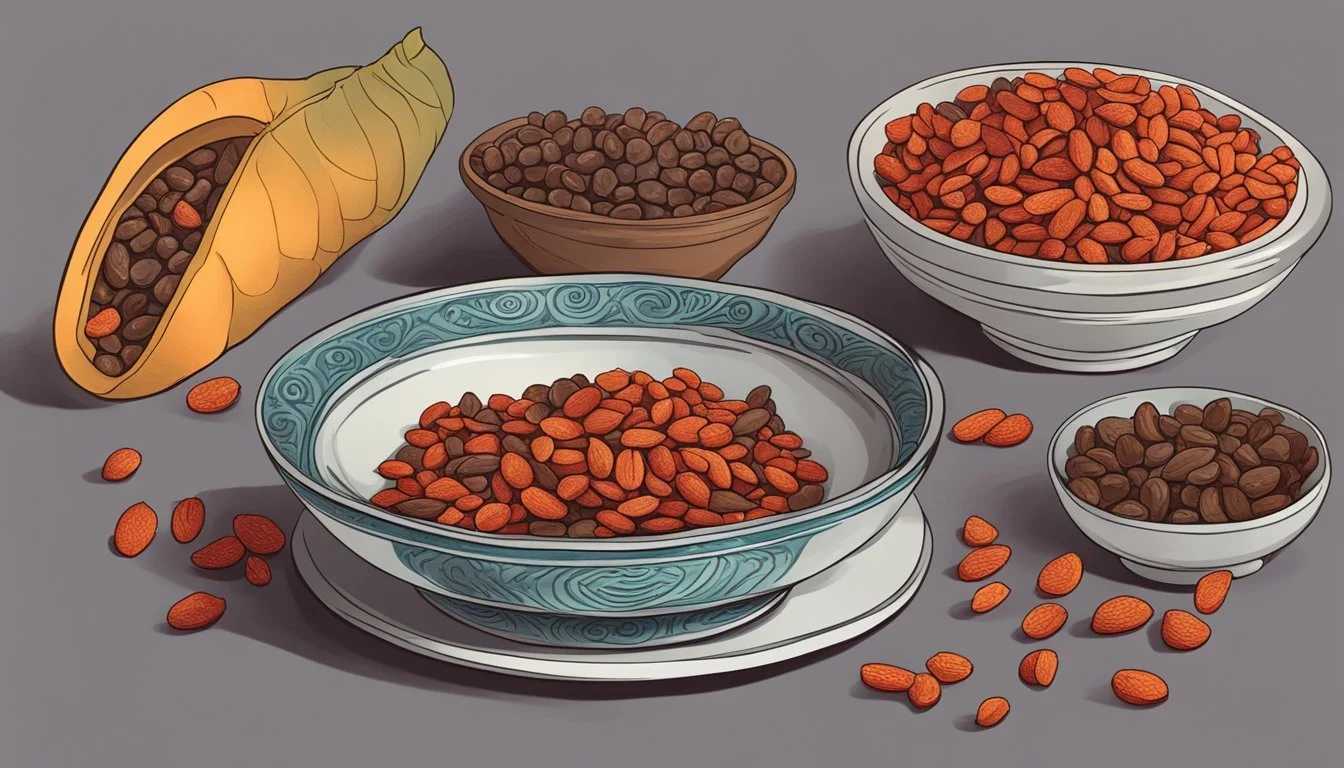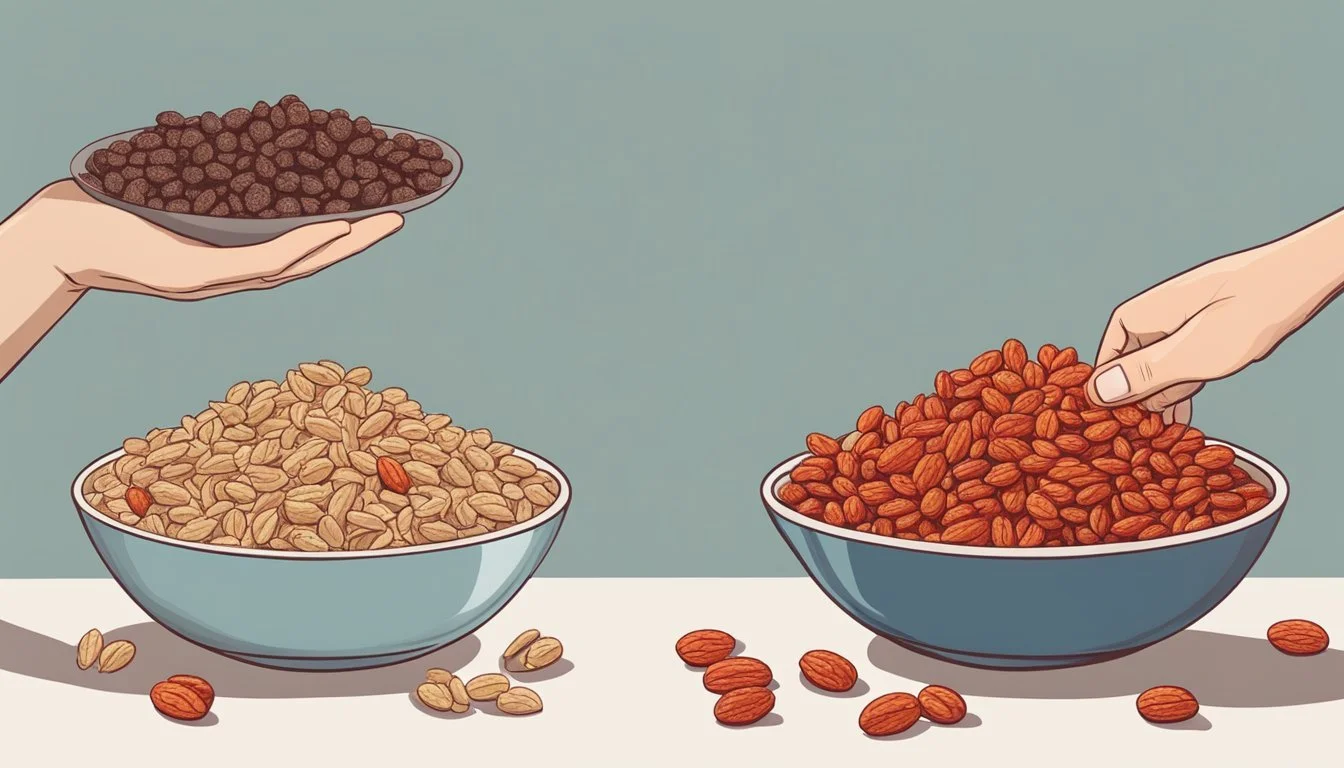How to Substitute Goji Berries for Raisins
A Simple Swap Guide
Goji berries and raisins are both nutritious dried fruits commonly found in a variety of recipes ranging from baked goods to savory dishes. They each bring a unique set of flavors and health benefits to the table. Goji berries are known for their bright red hue and are often touted for their high vitamin and mineral content, including iron, vitamin C, and fiber. With a slightly tart yet sweet flavor, they can add a vibrant twist to many dishes where raisins are typically used. Raisins, which are dried grapes, are typically sweeter and have a chewy texture, making them a staple in cereals, snacks, and as a natural sweetener in baked goods.
When substituting goji berries for raisins, it’s important to consider the texture and moisture content each adds to the recipe. While both can be interchangeable on a 1:1 basis by volume or weight, goji berries tend to be less sweet and chewier than raisins. This difference may affect the overall taste and texture of the dish. In recipes where the distinct sweetness and moistness of raisins are desired, adjustments may need to be made to achieve a similar profile when using goji berries.
For bakers and cooks looking to make the switch, integrating goji berries into recipes where raisins are called for can be a simple process. They can be used in their dried form or rehydrated, depending on the preparation and desired outcome of the dish. In savory dishes or when a tart note is preferred, goji berries can offer a unique twist without compromising the integrity of the recipe. However, in sweets and desserts, additional adjustments, such as increasing the sweeteners or altering liquid ratios, might be necessary to maintain the dish's balance.
Nutritional Comparison Between Goji Berries and Raisins
When substituting goji berries for raisins or vice versa, one should consider the distinct nutritional profiles of each. These differences affect their vitamin and mineral content, as well as their fiber, antioxidant, and caloric levels.
Vitamin Content
Goji Berries: Rich in Vitamin C, providing significantly more than raisins. They are also a good source of B-vitamins.
Raisins: Contain lower levels of Vitamin C compared to goji berries but still offer some B-vitamins.
Mineral Makeup
Goji berries boast a higher concentration of certain minerals than raisins.
Iron: Goji berries contain 62% more iron than raisins.
Calcium: They also have a higher calcium content.
Phosphorus and Magnesium: Both fruits provide these minerals, with goji berries typically offering more.
Fiber and Antioxidant Levels
Fiber and antioxidants play a crucial role in one's diet, and these dried fruits vary in their offerings.
Fiber: Goji berries are superior in fiber content.
Antioxidants: Goji berries outshine raisins with five times the antioxidant power. Antioxidants are vital in protecting the body from oxidative stress.
Caloric and Sugar Content
While both fruits are sweet and energy-dense, their caloric and sugar makeup differ.
Calories: Raisins tend to be higher in calories due to their sugary content.
Sugar: Raisins generally contain more sugar compared to goji berries when equal servings are compared.
Health Benefits of Goji Berries vs. Raisins
When comparing the health benefits of goji berries and raisins, one finds distinct differences in nutrient content and health-promoting properties. While both are beneficial, goji berries have a stronger nutritional profile in certain aspects.
Heart Health and Anti-Inflammatory Properties
Goji berries exhibit a higher content of polyphenols and antioxidants, substances that support heart health by maintaining healthy cholesterol levels and offering anti-inflammatory effects. Raisins, while also beneficial due to their fiber content, do not match the anti-inflammatory potency of the goji berry's polyphenols.
Digestive Health and Glycemic Index
Goji berries are rich in dietary fiber, which promotes digestive health by aiding in regular bowel movements. They also have a lower glycemic index than raisins, meaning they cause a slower rise in blood sugar levels—a significant factor for individuals managing their glucose intake. In contrast, raisins often have a higher natural sugar content, resulting in a quicker spike in blood glucose.
Immune System Support
The immune system benefits from the high levels of Vitamin C found in goji berries. This nutrient is essential for immune function and skin health, and goji berries deliver it in greater quantities than raisins. Additionally, goji berries contain unique polysaccharides that play a role in immune support though further research is needed to fully understand this relationship.
Culinary Uses and Taste Profiles
Replacing goji berries with raisins in recipes necessitates understanding both their culinary uses and how their distinct taste profiles can influence a dish.
Substituting in Recipes
When substituting raisins for goji berries, it's essential to consider the role goji berries play in the recipe. Goji berries are often used for their nutrient-dense profile and their distinct sweet-tart taste. Raisins, while also nutrient-rich, provide a different kind of sweetness and texture. They are best used in:
Baking: Like muffins or cookies where goji berries might be called for.
Cooking: In savory dishes such as stews or grain pilafs.
Snacking: Where goji berries might be eaten on their own.
For a 1:1 substitution, measure out the same amount of raisins as the goji berries called for. However, if the recipe depends on the unique tartness of goji berries, you might want to adjust other ingredients to achieve a closer flavor profile.
Taste and Texture Considerations
The taste and texture of raisins differ significantly from goji berries.
Taste: Goji berries offer a complex flavor, described as slightly tart with a hint of sweetness, likened to a blend of cranberry and cherry. Raisins are generally sweeter and lack the tartness goji berries possess.
Texture: Goji berries, when rehydrated, can resemble a soft cherry tomato, being plumper and juicier. Raisins usually present a chewier texture, especially when used straight from the package without rehydrating.
Sweetness: The inherent sweetness of raisins can alter the nuanced balance of flavors in a dish, especially if it originally counts on the subtle tartness of goji berries.
Moisture: Raisins may contain less moisture than rehydrated goji berries, which could affect the dish's moisture balance. Adjusting liquid ingredients may be necessary to compensate.
To successfully substitute raisins for goji berries, the chef should carefully assess the desired texture and taste outcome of the completed dish.
Alternative Substitutes for Raisins
When seeking to replace raisins in a recipe, various dried fruits offer a range of flavors and nutritional benefits. This section explores several options from commonly found dried cranberries to more exotic fruits, as well as their nutritional profiles.
From Dried Cranberries to Exotic Fruits
For a tangy twist, dried cranberries serve as a direct substitute for raisins in most recipes, delivering a similar chewy texture and a burst of tartness. Dried cherries also offer a unique sour-sweet flavor profile. Both can be used in a 1:1 ratio for raisins. Similarly, dried blueberries add a touch of brightness with their distinct flavor and antioxidant qualities.
Should one desire a sweeter alternative, minced figs or dates, both rich and caramel-like in taste, can effectively mimic the sweetness of raisins. For those preferring a fruit with a tropical note, dried mango adds both sweetness and vibrant color to dishes. Dried apricots offer a subtly sweet flavor and are ideal in savory dishes as well as baked goods.
For an alternative closer to the raisin's taste profile, golden raisins, derived from white grapes, provide a sweeter and plumper option. Meanwhile, dried currants, which are smaller and tart, could somewhat mimic the original's flavor while adding an interesting textural difference.
Understanding Nutritional Profiles of Alternatives
Nutritionally, these substitutes for goji berries have differing profiles. Dried cranberries are often sweetened, contributing additional sugars. Prunes, while higher in calories, contain fiber and may aid digestion. Dried cherries and blueberries are valued for their antioxidant properties, linked to various health benefits.
Exotic dried fruits like dried mango tend to be high in sugar but are also a good source of vitamins A and C. It's important to note that while dates are rich in potassium and fiber, they are calorie-dense. Dried apricots are lauded for their vitamin A content and can serve as a healthier alternative with lower sugar content compared to raisins.
Table: Nutritional Comparison per 100g
Fruit Calories Sugar (g) Fiber (g) Vitamins Dried Cranberries 325 65 6 Vitamin C, E Dried Cherries 325 60 7 Antioxidants Dried Blueberries 325 68 9 Vitamin C, K Dates 282 75 8 Potassium Dried Apricots 241 53 7 Vitamin A, C, E Dried Mango 319 66 2 Vitamins A, C Prunes 240 38 7 Fiber, Vitamins A,K
While raspberries, blackberries, and other fresh fruits are excellent additions to various dishes, their higher water content compared to their dried counterparts affects how they interact in recipes, specifically baked goods.
It is advised to consider the specific needs of a recipe before choosing a raisin substitute, especially pertaining to moisture content, sweetness, and textural outcome.
Practical Concerns and Considerations
Substituting goji berries for raisins requires attention to availability, cost considerations, storage procedures, and awareness of dietary restrictions. These factors ensure a successful replacement in recipes.
Availability and Cost
Goji berries and raisins differ in availability and can vary in price. Raisins are widely available and generally less expensive than goji berries. While raisins are a common supermarket item, goji berries might be more commonly found in health food stores or specialty markets. The price of goji berries is often higher than that of raisins, which could impact the budget for a recipe.
Availability:
Raisins: Commonly found in most grocery stores.
Goji Berries: Might require a trip to a health food store or online purchase.
Cost:
Raisins: Typically more affordable.
Goji Berries: Can be significantly more expensive, depending on the source.
Preservation and Storage Methods
Both goji berries and raisins will last longer when stored properly. For raisins, a cool, dark place in an airtight container is best. Goji berries, whether in fresh or dried form, also require airtight containers but could be refrigerated to prolong their freshness. Fresh goji berries have a shorter shelf life and may necessitate freezing for extended storage.
Storage:
Raisins: Airtight container in a cool, dark place.
Goji Berries: Airtight container, refrigerated if fresh; freezer for extended storage.
Dietary Restrictions and Allergies
Substituting goji berries for raisins must take into account individual dietary needs. While both are generally safe, goji berries contain higher levels of sodium—a consideration for those on sodium-restricted diets. Additionally, people with allergies should be aware that while it's rare, goji berries can cause an allergic reaction, particularly in those who are sensitive to other fruits or pollen.
Sodium Content:
Raisins: Low in sodium.
Goji Berries: Higher sodium content, which could be a concern for some diets.
Allergies:
Both can be potential allergens, though goji berry allergies are less common but more severe when they do occur.
By considering these practical concerns and weighing the implications of substituting goji berries for raisins, cooks can make informed decisions that align with their recipe goals and dietary needs.
Making the Switch to Goji Berries
Substituting goji berries for raisins can offer a different nutritional profile and taste to your dishes. This section outlines how to adjust quantities and introduce goji berries into your diet effectively.
Adjusting Quantities and Ratio
When replacing raisins with goji berries, the ratio is typically 1:1. However, because goji berries are less sweet and slightly more tart, one might consider a slight increase in quantity if a sweeter taste is desired. It's important to note the nutritional differences:
Calories: Goji berries contain fewer calories than raisins.
Protein: They offer more protein per serving.
Fiber: Goji berries are a good fiber source, aiding in digestion.
Net Carbs: They have fewer net carbs.
Fats: Both have low fat content, but goji berries have slightly more.
Saturated Fat: Each has minimal saturated fat.
Daily Need Coverage Score: Goji berries might provide a broader range of vitamins and minerals.
Nutrient Raisins (per 100g) Goji Berries (per 100g) Calories 299 349 Protein 3.1g 14.3g Fiber 3.7g 13g Net Carbs 79g 64g Fats 0.5g 0.39g Saturated Fat 0.06g 0.06g
Incorporating Into Diets
When incorporating goji berries into one's diet, it's essential to consider their compatibility with various recipes. Goji berries work well in smoothies, muffins, pancakes, and granola bars. They also rehydrate well, which can be useful for certain Asian dishes where a plumper texture is needed. Since goji berries are higher in antioxidants, they can potentially add an extra nutritious boost.
With Liquid: Adding water to dried goji berries allows them to rehydrate. This is useful for recipes where moisture is necessary.
Dry: Using them dry works well in baking or as a topping for salads and yogurt.
Consumers should also be mindful of any dietary considerations, such as sugar intake or caloric needs, as these factors may affect the suitability of goji berries as a substitute for raisins.
Cultural and Historical Context
Goji berries, also known as wolfberries, have been celebrated for centuries within Asia for their taste and purported health benefits. This section delves into the origin of these berries alongside their historical applications, particularly within traditional medicine.
Origin and Popularity
Goji berries are predominantly cultivated in Asia, with a rich history rooted in China, specifically the regions such as Tibet. They derive from two closely related plants, Lycium barbarum and Lycium chinense, both of which are members of the nightshade family. The berries have been a staple in Asian diets for generations due to their sweet and slightly tart flavor, resembling the taste of cranberries and cherries mixed together. Their popularity is not limited to Asia; in recent years, they have gained global recognition as a 'superfood'.
Traditional and Medicinal Uses
Historically, goji berries have held a significant place in traditional medicine across various Asian cultures. They have been used for promoting longevity and prevention of various health ailments. The berries are often associated with nourishing the 'yin' and enhancing the immune system.
Preventative Measures: Utilized in traditional medicine to prevent issues related to vision, kidney, and liver functions.
Longevity and Wellness: Consumed regularly by those seeking to promote overall well-being and long life.
In regions like Tibet, goji berries have formed part of the local diet for centuries, often consumed in dried form or as a juice. They're believed to contribute to the robust health and longevity observed in local populations.
Scientific Insights and Future Trends
Recent scientific inquiries have shed light on the nutritional impact of goji berries as replacements for traditional berries such as raisins. The evolving landscape in health foods is influencing consumption patterns, with a noticeable shift towards ingredients with enhanced health benefits.
Recent Studies on Nutritional Impact
Recent studies have highlighted that goji berries possess significant antioxidant properties. They are rich in vitamins such as vitamin A, vitamin C and vitamin E, all of which are known for their roles in supporting immune function, skin health, and eye health. Moreover, goji berries contain beta-carotene, which the body can convert into vitamin A, and they are a good source of minerals such as iron, selenium, potassium, zinc, copper, manganese, as well as several B-group vitamins including vitamin B1, vitamin B2, vitamin B3, vitamin B5, vitamin B6, and contain trace amounts of vitamin B12.
Antioxidant Comparison: Substitute goji berries offer higher levels of antioxidants compared to raisins.
Vitamins: They provide a wider vitamin profile, including both fat-soluble (A, E, K) and water-soluble (B-complex, C) vitamins.
Minerals: A rich mineral content positions goji berries as a superior nutritional option with elements such as manganese and copper.
Emerging Patterns in Health Foods
The shift in consumer preference towards functional foods is noticeable, especially those that demonstrate a potential impact on well-being and health maintenance. Goji berries, as a superfood, are increasingly popular as they fit right into the functional food category due to their dense nutritional composition and possible therapeutic properties.
Trend Analysis: There is an upward trend in choosing goji berries over more traditional options like raisins due to their comprehensive nutrition profile.
Health Benefits: The demand for foods that support overall health, including immune system support and chronic disease prevention, appears to be the key driver.
Consumer Awareness: Knowledge of nutrient-specific benefits, such as the role of selenium in antioxidant defense and the importance of vitamin K for bone health, is becoming more widespread.
Conclusion
Substituting goji berries for raisins in recipes requires considering their nutritional profiles and how their use may influence the flavor and health benefits of the dish.
Summary of Key Points
Sweetness: Goji berries are less sweet compared to raisins. When substituting, one might need to adjust the sweetness of the recipe accordingly.
Texture: Goji berries offer a different texture; they are chewier than the softness of raisins.
Nutrients: Goji berries are known for their high antioxidant content, whereas raisins offer a quick energy boost from their natural sugars.
Raisin Substitute: An equal 1:1 substitution ratio works in most cases for goji berries replacing raisins.
Moisture Content: Fresh goji berries or rehydrated dried goji berries introduce more moisture into recipes than raisins.
Final Recommendations
Bone Health: Individuals seeking to enhance bone health can benefit from the high calcium content in goji berries compared to raisins.
Nutrient Comparison:
Vitamins: Goji berries are rich in vitamin A, while raisins provide a good amount of vitamins C and B.
Minerals: Raisins typically contain more iron; yet, goji berries have higher zinc and selenium concentrations.
Macronutrient Comparison:
Nutrient Goji Berries Raisins Carbohydrates Lower Higher Proteins Higher Lower Fats Similar Similar
Spices: When using goji berries as a substitute, consider pairing them with complementary spices, such as cinnamon or nutmeg, to enhance their natural flavor without overshadowing the dish.









